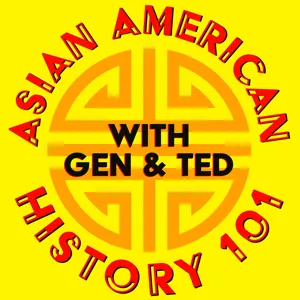The History of Bangladeshi Americans


Welcome to Season 4, Episode 10! Today we’re talking about Bangladeshi Americans, a separate group of the South Asian diaspora (Desi community) that’s a growing presence in the U.S. We go back to Bangladesh and talk about the importance of the area to the rest of India and the British Empire. Knowing the history of Bangladesh is essential to understand some of the struggles the Bangladeshi community has had in America.
We also discuss the trauma of the Partition of India in 1947 as well as the Bangladesh War of Independence in 1971… but both events contributed to the formation of the People’s Republic of Bangladesh. It’s a unique area in South Asia, and the resilience of the people has added to some of the most positive qualities found in Bangladeshi Americans. This episode just scratches the surface of the community. We highly recommend Bengali Harlem, created by filmmaker and scholar Vivek Bald, which now includes a book, a documentary, and a site with Family Stories.
If you like what we do, please share, follow, and like us in your podcast directory of choice or on Instagram @AAHistory101. For previous episodes and resources, please visit our site at https://asianamericanhistory101.libsyn.com or social media links at http://castpie.com/AAHistory101. If you have any questions, comments or suggestions, email us at info@aahistory101.com.
Segments
- 00:25 Quick Intro
- 01:38 The History of Bangladeshi Americans
- 33:22 Shameless Plug… We’re Consultants for Hire











 Welcome to Season 4, Episode 3. As many of you know, we love hockey! Recently, in November 2023, George Chin, a legend of Asian Canadian ice hockey, passed away. He was the star winger on the Chin brothers line along with his brothers Bill and Albert. The Chinese Canadian trio helped their hometown Lucknow team to be highly successful. In this episode, we talk about the life of George Chin and all the teams he made an impact on.
Welcome to Season 4, Episode 3. As many of you know, we love hockey! Recently, in November 2023, George Chin, a legend of Asian Canadian ice hockey, passed away. He was the star winger on the Chin brothers line along with his brothers Bill and Albert. The Chinese Canadian trio helped their hometown Lucknow team to be highly successful. In this episode, we talk about the life of George Chin and all the teams he made an impact on.
 Welcome to Season 4, Episode 2! There’s a global fascination with the Old West cowboys in America. Did you know that the Hawaiian Paniolo pre-dates the Old West cowboys by several years? The Mexican Vaqueros have even more history. In this episode, we talk about the history of the Paniolo… AKA the Hawaiian Cowboy.
Welcome to Season 4, Episode 2! There’s a global fascination with the Old West cowboys in America. Did you know that the Hawaiian Paniolo pre-dates the Old West cowboys by several years? The Mexican Vaqueros have even more history. In this episode, we talk about the history of the Paniolo… AKA the Hawaiian Cowboy.
 Welcome to Season 4, Episode 1. Happy New Year! We hope you had a wonderful holiday season and had fun on New Year’s Eve. To launch this new season, we’re going back to the thing that’s at our core… Asian American History. Our special guests for this conversation are
Welcome to Season 4, Episode 1. Happy New Year! We hope you had a wonderful holiday season and had fun on New Year’s Eve. To launch this new season, we’re going back to the thing that’s at our core… Asian American History. Our special guests for this conversation are